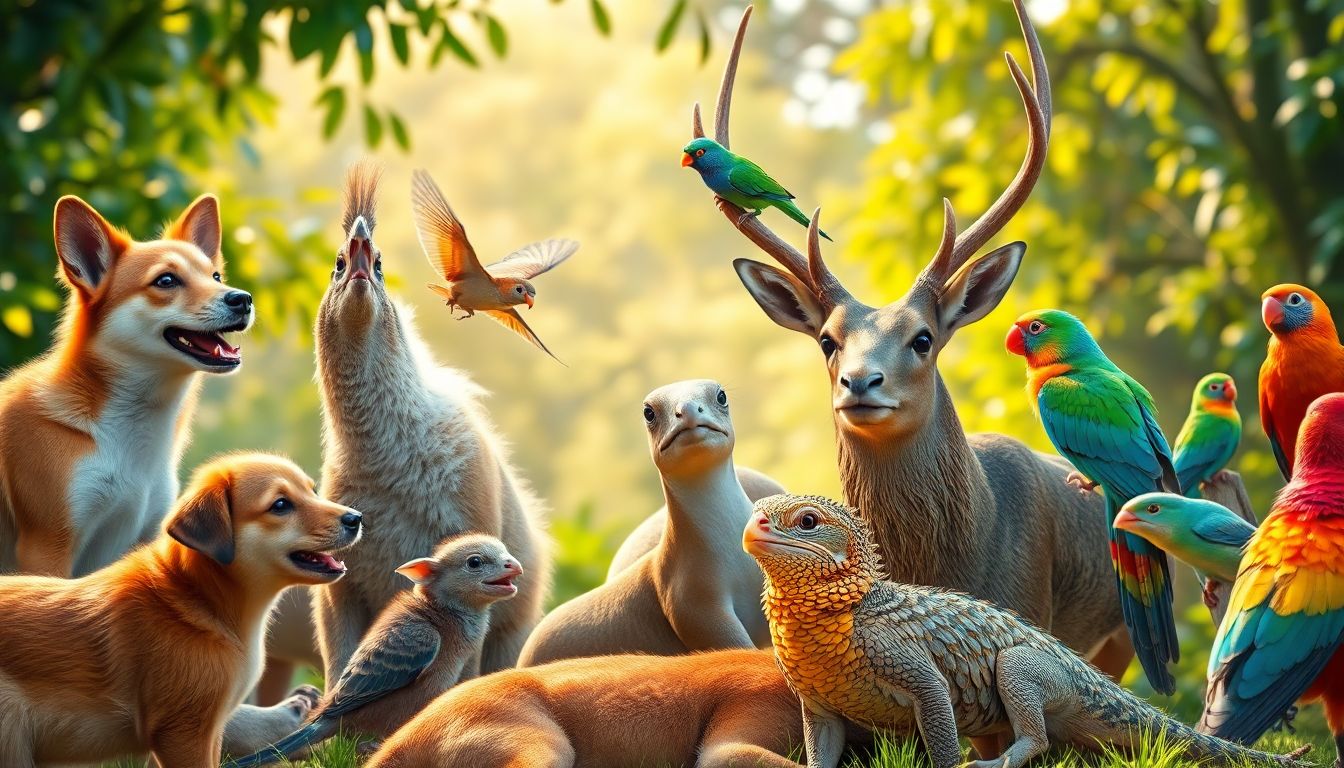
Imagine a golden retriever, tail wagging, bringing endless joy to a family. But sadly, many animals face dangers daily. Ecosystems suffer, and countless species struggle for survival. We all have a special bond with animals. This article looks into our relationships with them. We will explore caring for pets, and how to protect wildlife. Also, we'll see how animals just make our lives better.
Understanding the Animal Kingdom
Animals fill our world. They are so diverse, doing a lot to keep our planet healthy. Learning about animals helps us respect them more. Let's check out how they're grouped, and their roles in nature.
Animal Classification and Biodiversity
Animals are grouped into classes. Think of mammals, birds, reptiles, amphibians, fish, and invertebrates. Mammals, like us, have fur or hair and feed milk to their young. Birds have feathers, while reptiles have scales. Amphibians live both in water and on land. Fish live in water, and invertebrates don't have backbones, for example insects. Each group has unique traits. Biodiversity means a wide variety of life. It is super important for a stable world.
The Ecological Importance of Animals
Animals keep nature healthy. Bees pollinate flowers. Birds spread seeds. Predators control populations. Worms decompose stuff. These actions keep our ecosystems balanced. Losing animal populations can really harm the environment. It's vital to protect their roles. Every animal has a purpose.
Animal Behavior and Communication
Animals act in different ways. Some actions are instincts. Like a bird building a nest. Other actions are learned. Like a dog doing tricks. Animals talk to each other too. They use sounds, body language, and even scents. Understanding this helps us connect. Knowing how animals "talk" makes us better friends.
Responsible Pet Ownership: A Lifelong Commitment
Having a pet is awesome! It's also a big deal, needing time, effort, and love. Choosing the right pet and caring for them well is a duty. Let's dive into how to be a great pet parent.
Choosing the Right Pet for Your Lifestyle
Think before you get a pet. Does your place allow it? Do you have time for walks? Are you allergic? A calm cat might be better for a small apartment. A high-energy dog needs lots of exercise. Research what a pet needs to be happy. Make a responsible pick for both of you.
Providing Proper Care: Nutrition, Exercise, and Healthcare
Pets need good food, water, and exercise. Grooming keeps them comfy. Vet visits are also a must. Shots prevent diseases. Parasite control keeps them healthy. Dental care avoids problems. If you take care of these needs, they will stay happy.
Understanding Pet Behavior and Training
Training helps pets fit into our lives. Positive training is best, such as rewards, not yelling. Some behavior issues need help. If your pet acts strange, see a pro. With patience and love, pets can be awesome.
Wildlife Conservation: Protecting Endangered Species and Habitats
Wildlife faces trouble. Habitats are lost. Pollution is everywhere. Climate change hurts animals. We must protect them. Conservation helps save species. Let's learn ways to help wildlife.
Threats to Wildlife: Habitat Loss, Pollution, and Climate Change
Forests are cut down. This removes homes for many animals. Pollution poisons water and air. Climate change shifts weather patterns. These hurt animal populations a lot. Many species are at risk.
Conservation Strategies: Protecting Habitats and Reducing Human Impact
We can protect habitats. We can stop poaching. Captive breeding helps too. Sustainable practices help. Reduce waste to keep our earth healthy. These actions help wildlife thrive.
How You Can Help: Supporting Conservation Organizations and Making Sustainable Choices
You can help by donating. Pick good groups that do great work. Lower your carbon footprint. Avoid products from endangered species. Small actions make a big impact. Every effort matters.
The Benefits of Human-Animal Interactions
Animals make us happier and healthier. They ease stress. They offer support. Pets just bring a lot of good to our lives. Let's see the benefits of having them.
Emotional and Mental Health Benefits
Pets lower stress and anxiety. They fight loneliness. Therapy animals help people cope. Even just petting an animal soothes. They offer comfort and support. Animals give lots of love.
Physical Health Benefits
Pet owners are more active. Dog walks boost health. Pets improve heart health too. Playing with them makes you move. These activities keep us fit.
Animals in Service: Assistance and Support
Service dogs guide the blind. Therapy dogs comfort people. Animals offer emotional support. They help people with disabilities. They make life easier. They are amazing helpers.
Celebrating Animals: Appreciation and Respect
We should respect all animals. They have a right to live well. They should be treated with care. Learning about animals makes us appreciate them.
Ethical Considerations: Animal Welfare and Rights
Factory farming is cruel. Animal testing raises questions. We should improve animal welfare. Treat them with respect. Their lives matter, too.
The Cultural Significance of Animals
Animals appear in art and stories. They have meanings in cultures. They connect us to the past. Knowing this makes us value them. It makes us appreciate them more.
Fostering Empathy and Compassion for Animals
Learn about animals. Understand how they feel. Be kind to them. Treat them well. This helps build a better world. It spreads love and respect.
Conclusion
Animals enrich our world. It is important to understand them. Caring for pets, supporting conservation, and showing respect is essential. Take action today to help animals. Whether it's adopting a pet or reducing your footprint. Show kindness. Animals are important to our planet and to us.

.webp)












0 Comments